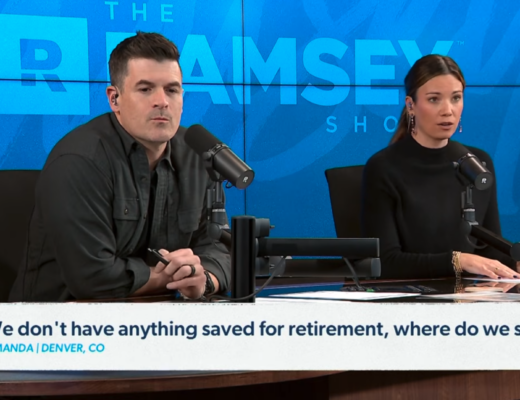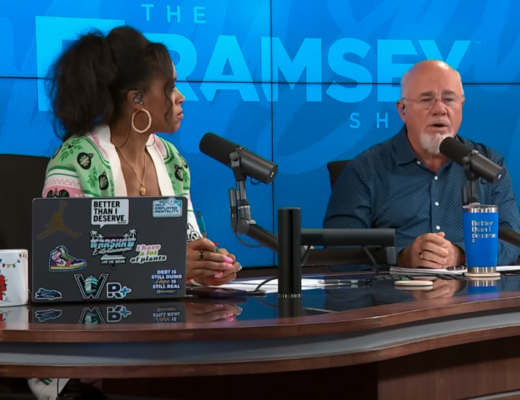Recently listened to a call on The Ramsey Show that stopped me in my tracks. A young man named Aidan, just 22 years old, called in asking for advice on managing finances with his fiancée. What unfolded wasn’t just financial advice—it was a wake-up call about self-worth that many of us need to hear. It was a moment of tough love, and it hit hard.
The Trap of Low Expectations
What struck me most was Dave Ramsey’s piercing question to Aidan: “Why are you putting yourself on a struggle slice? Why are you choosing that?”
It’s a question many of us should ask ourselves. How often do we settle for less than we’re worth? How many of us accept financial hardship as our fate rather than a temporary situation we can change?
The math was stark: Aidan was earning roughly $26 a day. As Dave pointed out, he could triple that amount just by mowing lawns for a day. In fact, Aidan had previously worked for a lawn company making $16 an hour—double what he was making at his restaurant jobs.
“You are fit. You are young. You are smart. The world is your oyster.”
These words from Jade on the show weren’t empty platitudes. They were a reminder that our circumstances often reflect our self-perception more than our actual potential.
Breaking the Cycle of Underemployment
I see this pattern frequently in my financial coaching: people stacking multiple low-paying jobs instead of pursuing one quality position. They add more hours at minimum wage rather than seeking better opportunities that match their capabilities. Sometimes, it takes a little tough love to recognize that more work doesn’t always mean better results.
Here’s what I believe we can all learn from Aidan’s situation:
- Don’t confuse activity with progress—working three minimum wage jobs isn’t necessarily better than one good job
- Your current income doesn’t define your worth or potential
- Sometimes the biggest obstacle to financial improvement is our own belief system
Dave’s advice to Aidan was practical and immediate: stop accepting jobs that undervalue you. Look for construction work, return to lawn care, or find employment at places like Walmart or grocery stores that would immediately double his income.
Finding Your True Value
What I found most powerful was Dave’s gift to Aidan—a book called “Find the Work You’re Wired to Do.” The premise is simple but profound: identify what you’re naturally good at, what you enjoy doing, and what results motivate you.
This approach isn’t just about making more money; it’s about aligning your work with your natural talents and interests. When you do that, financial rewards tend to follow.
I believe this framework applies to all of us, regardless of our current financial situation:
- Assess your natural talents and strengths
- Identify work you genuinely enjoy
- Determine which results give you satisfaction
- Seek opportunities that combine these elements
The intersection of these factors is where your highest earning potential typically lies.
The Cost of Settling
Aidan and his fiancée were living below the poverty line not because of external circumstances but because of limited beliefs about their earning potential. They were planning a wedding while visiting food banks—a disconnect that reveals how we sometimes accept financial hardship while pursuing other life goals.
I’ve seen this pattern repeatedly in my work with clients. We accept financial limitations as fixed while other aspects of our lives move forward. This creates tension and ultimately undermines our ability to build stable futures.
Your income is not a fixed variable—it’s something you can actively change through deliberate choices and actions.
The most important takeaway from Aidan’s call wasn’t about budgeting techniques or expense cutting. It was a moment of tough love—a reminder to recognize your own value in the marketplace and refuse to accept less than you’re worth.
If you’re struggling financially, ask yourself: Am I settling for less than I’m capable of earning? Have I convinced myself that my current income is the best I can do? What beliefs are holding me back from pursuing better opportunities?
Sometimes the most important financial move isn’t cutting expenses or creating a budget—it’s recognizing that you deserve more and taking immediate action to increase your income.
Frequently Asked Questions
Q: How can someone quickly increase their income without specialized skills?
There are several immediate options for boosting income without specialized training. Construction labor, lawn care, retail positions at companies like Walmart or grocery stores, and warehouse work typically pay significantly more than food service jobs. The key is to look beyond your current industry and be willing to do physical work that others might avoid.
Q: Is it better to have multiple part-time jobs or one full-time position?
In most cases, one quality full-time position offers better financial outcomes than multiple minimum-wage jobs. Full-time positions typically provide more consistent hours, potential benefits, and clearer advancement paths. Multiple jobs often create scheduling conflicts, increase transportation costs, and limit your ability to advance in any single role.
Q: How important is mindset when trying to improve your financial situation?
Mindset is often the primary factor determining financial outcomes. Many people remain in financial hardship not because of external limitations but because they’ve convinced themselves they can’t do better. Recognizing your true value and believing you deserve more is often the first step toward making meaningful financial improvements.
Q: What should couples do when one partner isn’t contributing equally to household finances?
This requires honest communication about expectations and capabilities. If one partner is underemployed (like Aidan’s fiancée working only 4-5 hours weekly), have a direct conversation about financial goals and what each person needs to contribute. Sometimes partners need encouragement to pursue better opportunities or to recognize when their current work situation isn’t sustainable for the household.







